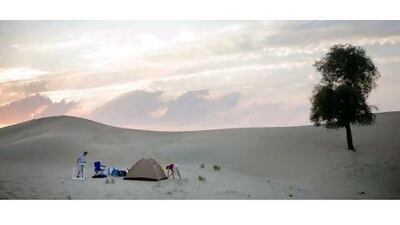DUBAI // For thrill seekers and those with an adventurous spirit there is nothing quite like experiencing the harsh beauty of the desert on a camping trip.
However, without the right precautions, being in the great outdoors can quickly turn an exciting situation into a potentially dangerous one.
"The UAE has some of the best desert to go camping in," said Samir Abbas, the chief executive of Extreme Adventure Tourism in Dubai.
"When you are out there, there is a sense of stillness and calm and the city seems very far away. I find it very relaxing."
Video:A bedouin and his prized camel
The most prized asset - the camel
He warned, however, that anyone trekking into the desert unprepared risked getting into difficulties.
"The simple rule is: always take a backup," advised Mr Abbas. "It sounds simple but taking a four-wheel drive car is crucial. I have heard of cases where people take out their normal road cars to the desert, and it never ends well."
Tyres need to be deflated before driving on the sand dunes, and campers should carry shovels and air compressors to reflate tyres in the event of punctures.
"If you're going deep into the desert for camping, always take a jerrycan of fuel," said Mr Abbas. The type of tent used in the desert is also important. It should have a zip, and be securely fixed to the ground in case conditions become windy.
"Have a good supply of water, that is one of the most common mistakes we see. People go camping and then realise they haven't brought enough water.
"A first aid kit to deal with burns and insect bites as well as good quality sleeping bags - because it can get very cold at night - are a must.
"Always make sure you close the tent completely at night to prevent insects and reptiles from getting in.
"When people stay overnight they also tend to have barbecues and it's important to take garbage bags with you to clean up afterwards and take the rubbish with you when you leave.
"What is really sad is when all these people go out camping and then leave their rubbish behind. It's very important to take these bags and other waste with you."
Choosing a good site when pitching a tent is crucial. The ideal location is a flat area sitting on a high dune.
"It's important you have a good range of vision all around you and so that other people can see you. If you camp at the bottom of a dune there's a good chance that other people out dune bashing might not see you and that could result in an accident if they come racing over the top," said Mr Abbas.
For Riyaz Abdul, a 31-year-old Indian, who works as an interior designer in Dubai, the attraction of camping in the desert is in being closer to nature.
"I've lived in Dubai for 20 years and the desert has always held this fascination for me," he said.
"I go camping about once a week usually with 10 to 15 other friends.
"We've done the Liwa to Al Ain desert crossing and camped out in the evenings.
"It's amazing because the desert is so quiet and you really feel isolated from the city.
"We always go in big groups because that way you can help one another if, for example, a car gets stuck in the sand or runs out of petrol or other supplies."

